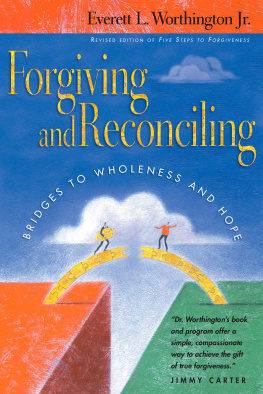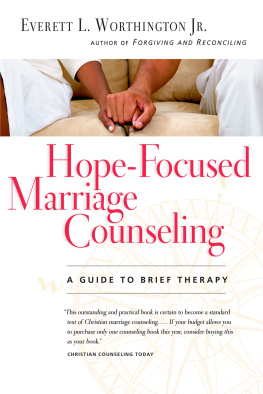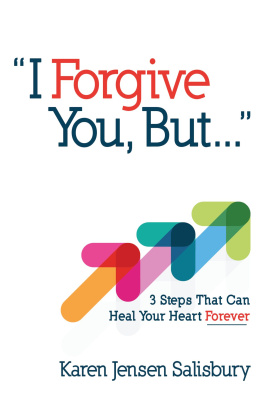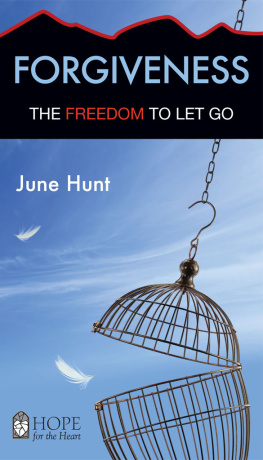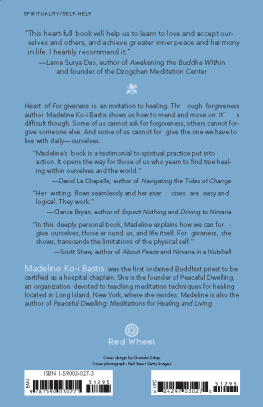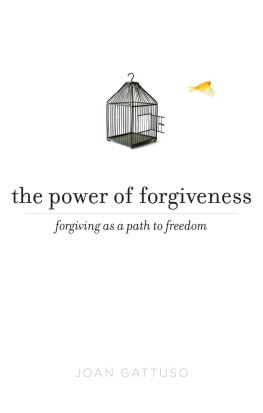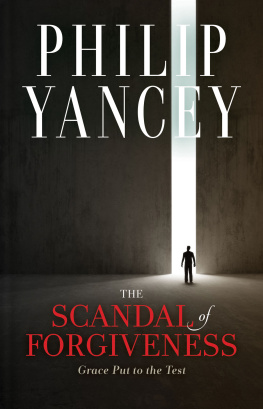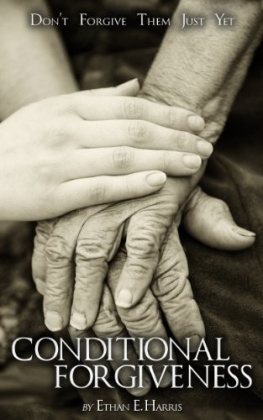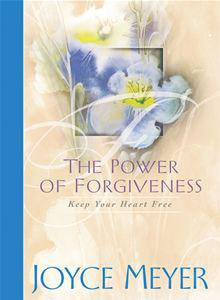Forgiving
and Reconciling
BRIDGES TO WHOLENESS AND HOPE
Everett L. Worthington Jr.
InterVarsity Press
P.O. Box 1400, Downers Grove, IL 60515-1426
World Wide Web: www.ivpress.com
E-mail:
Revised edition 2003 by Everett L. Worthington Jr.
Originally published as Five Steps to Forgiveness 2001 by Everett L. Worthington Jr.
All rights reserved. No part of this book may be reproduced in any form without written permission from InterVarsity Press.
InterVarsity Press is the book-publishing division of InterVarsity Christian Fellowship/USA, a movement of students and faculty active on campus at hundreds of universities, colleges and schools of nursing in the United States of America, and a member movement of the International Fellowship of Evangelical Students. For information about local and regional activities, write Public Relations Dept., InterVarsity Christian Fellowship/USA, 6400 Schroeder Rd., P.O. Box 7895, Madison, WI 53707-7895, or visit the IVCF website at .
All Scripture quotations, unless otherwise indicated, are taken from the Holy Bible, New International Version. NIV.
Copyright 1973, 1978, 1984 by International Bible Society. Used by permission of Zondervan Publishing House. All rights reserved.
Cover design: Cindy Kiple
Cover image: Michal Szota/iStockphoto
ISBN 978-0-8308-7526-9 (digital)
ISBN 978-0-8308-3244-6 (print)
This digital document has been produced by Nord Compo.
In memory of two, now departed,
who directed me toward helping others forgive
my mother, Frances McNeill Worthington,
and Lewis Smedes
Preface to the Revised Edition
I n September 2000 I finished writing Five Steps to Forgiveness: The Art and Science of Forgiving (Crown Publishers). It was published in October 2001. Bad timing for a book on forgivenessjust a month after the horror of September 11, 2001.
September 11 changed things. Many Christianshearts overflowing with love, compassion, sympathy and empathyrushed to New York to help. They gave money. They prayed for the victims.
Some Christians were more interested in justice than compassion; they were among the most likely to endorse extreme retribution toward the terrorists. How can Christians be among the most willing both to give and to get even? This speaks to the heart of three important virtues: forgiveness, justice and reconciliation.
Since I wrote Five Steps to Forgiveness, we have lived in a world sensitized by awareness of evil. We have seen scandals in the Roman Catholic Church; apologies did not appease, and Cardinal Bernard Law was forced to resign. Republican majority leader Trent Lott made segregationist comments; apologies again failed to satisfy, and he was forced to resign. The submarine captain who surfaced under a boat, killing eight Japanese adults and children, also apologized, but his career was ruined. Public outcry for justice appears ever more certain these dayseven when wrongdoers apologize.
In our research at Virginia Commonwealth University (VCU), we have learned a lot in the three years since I wrote Five Steps to Forgiveness. We have examined forgiveness and health, justice, apology, restitution, personality and Christian beliefs. We have examined forgiveness in restorative justice, medical and business settings. We have almost completed a six-year study of teaching forgiveness and reconciliation skills to early-married couples, and we have published a study in which we taught forgiveness to longer-married couples. We have studied forgiveness in Christians and people of other faiths. Finally, we have refined the five steps described in Five Steps to Forgiveness. Our scientific studies during the last few years have added richness to my understanding of forgiveness. I want to pass along my understanding, but not destroy the easy-to-understand method of forgiving and reconciling that I described in Five Steps.
Because the Five Steps book was written with a general audience in mind, it did not incorporate explicitly the Christian view on which my approach has, from the beginning, been built. In this new book, Forgiving and Reconciling, as I add new research findings on forgiveness, I also place forgiving within a Christian context. My theological understanding has been informed by studying Scripture, reading theologians (e.g., Augsburger, Jones, Volf) and interacting with Christians around the worldin academia, the pulpit, the counseling room and the pews.
I retain the core organization of Five Steps to Forgiveness, but I have condensed chapters to make space for new findings and discussions that are specifically Christian. I believe there are four languages that people use to communicate about forgiveness. People on the street speak of human experience. Theologians relate forgiveness to church history, writings of other theologians and Christian leaders, and Scripture. Psychologists speak of scientifically revealed understandings of emotion, behavior, mental activity and motivations. Neuroscientists talk of the ways our bodies (including our brains) and our experiences are connected. I am attempting to craft a language that, in some small way, helps people from these four language groups talk with each other.
I pray that this new version of the book will be true to the heart of the triune God, and that it will thus enrich and edify you. And I pray that your understanding, experience and practice of forgiving and reconciling will be blessed so that you make a positive difference in Gods kingdom.
Acknowledgments
I have been studying forgiveness at VCU since about 1984. It is impossible to acknowledge properly all the contributors who have shaped my ideas. If I start naming names, Ill create a list that will last pages, so I hope my friends, collaborators, colleagues, clients, couple-consultants, students and fellow church members will accept my heartfelt thanks and forgive me for not listing everyone by name.
I do want to acknowledge supporters of our research, the John Templeton Foundation (grant #239), the Fetzer Institute (grant #1653.3 to Jack Berry and myself) and VCUs General Clinical Research Center (NIH M01 RR00065). Without such financial assistance, very little of what has been done since 1997 would have been accomplished.Gail Ross and Jenna Land (at the Gail Ross Literary Agency) and Elizabeth Rapoport and Stephanie Higgs (at Crown Publishers) helped me get the original book into good shape. Im grateful.
I also want to thank Fuller Theological Seminary for inviting me to give the Fuller Integration Lecture series in 2000, arranged by Al Dueck. The Fuller series allowed me to think about the fit between scientific research and Christian theology. These lectures provided a stimulus for preparing talks on the topics, and much of that thinking has been incorporated into this book. Fuller also provided respondents who formally critiqued my lecturesDavid Augsburger, Randy Sorenson, Sherwood Lingenfelter, Terry Roberts and Kindra Nickerson, who gave challenging and lively critiques that pushed me to clarify much of my own thinking afterward. The intellectually inquiring collection of faculty, students, administrators and attendees also offered their comments and questions. The Fuller Lectures were formative in assisting this integration of the science and theology of forgiving.
My family, friends and Christian family have provided a safe holding place for me to learn about Christianity. My church, Christ Presbyterian Church in Richmond, under the leadership of Pastor Doug McMurry, has been a great support for almost twenty-five years. Doug is a long-term friend and coauthor who has shaped many of my ideas about love and its centrality in all of life.

